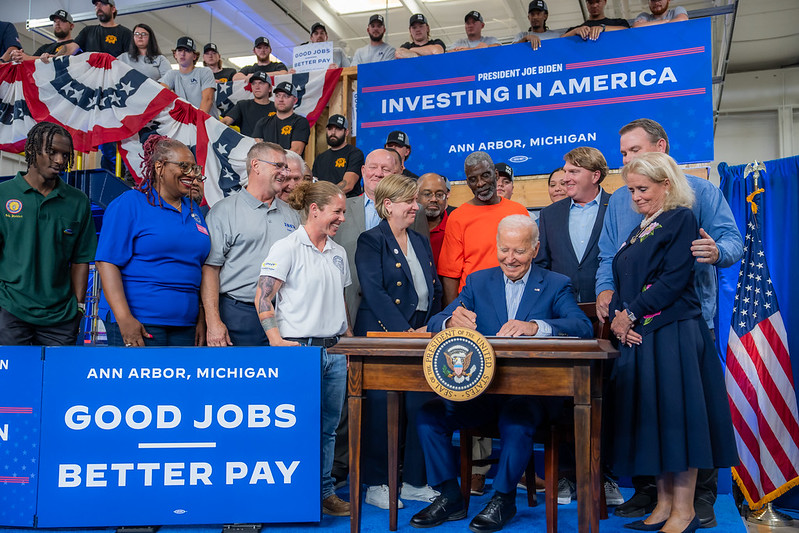
Paying the rent used to take up almost every paycheck Brandon Johnson brought home in a month. Then, he got a job as an apprentice helping build the new BlueOval City battery factory in rural West Tennessee.
Now a journeyman and first-time union member with LiUNA, the union representing construction workers at the site, Brandon is getting ahead. Today, he can afford his rent with just a portion of one paycheck. Slowly, he is getting used to that peace of mind.
“Down here. . . [y]ou had to work years to get more than $20 back then,” said Brandon – who then quickly corrected himself. “Not ‘back then,’ that was just two years ago.”
Now, “I’m actually financially stable so I can think about my next step and what I want to do in my life instead of just trying to get by or keep my head above water.”
At the U.S. Department of Labor, we believe that when the federal government invests a dollar, part of it should go toward creating good jobs that change lives for the better. Our partners at the Department of Energy supported BlueOval in West Tennessee through a loan that considered working conditions and community impact. In Tennessee, Ford — of which BlueOval is a joint venture — had adopted a Project Labor Agreement between contractors and labor that provided good pay for construction workers like Brandon.
It is an example of how our Good Jobs Initiative has partnered with federal agencies to ensure that nearly $240 billion in new federal projects create safer, better paying, and more accessible jobs.
But this work is just a start.
On Sept. 6 in Ann Arbor, Michigan, Acting Secretary Julie Su joined President Biden as he signed the Investing in America and Investing in Americans Executive Order. Or as we call it, the Good Jobs Executive Order.
Because of our good jobs successes, you may wonder why we need a Good Jobs Executive Order. The reason is simple: We can change the lives of many more workers like Brandon.
This administration still has billions more to invest on projects ranging from housing to hydrogen. This executive order will ensure these investments create more jobs that help workers not just get by, but get ahead.
Among other steps, the Good Jobs Executive Order:
Prioritizes federal project funding for jobs paying livable wages.
Promotes greater access to life-changing worker benefits like childcare, healthcare and transportation.
Better assures fair and equitable hiring practices and workplace safety.
The executive order also creates a task force of top agency leaders, co-chaired by Acting Secretary Su, that will build the blueprint for how federal agency dollars can maximize the number of good jobs they create.
Workers are not the only ones who benefit from good jobs. Jobs consistent with the Good Jobs Principles are more likely to see reduced costs from lower staff turnover, greater productivity and more customer satisfaction because of higher staff skill levels.
This means all Americans benefit from good jobs because of higher quality work in building safe roads and bridges, ensuring clean drinking water and expanding high-speed internet. It also means the Good Jobs Executive Order benefits employers by encouraging them to adopt good jobs practices that can improve their business through stronger relationships with their workers.
Dee Thomas sees this happening at her job.
She is a first-time union member who builds school buses at Blue Bird in Fort Valley, Georgia. In July, the plant received an $80 million electric vehicle conversion grant from the Department of Energy, which again considered job quality in its grant applications.
A couple months before Blue Bird’s award, Blue Bird and the United Steelworkers entered a first contract that raised some workers’ pay by more than 40% and included profit sharing. Dee, who helped negotiate the contract, said she and other Blue Bird workers are now even more invested in Blue Bird’s success.
“We just want to have a better future at the company. Blue Bird is going up [because of the grants] and we’re going to help them go up,” Dee said. “That’s what a contract means. Going up.”
Nick Beadle is policy counselor for the Good Jobs Initiative.

 U.S. Department of Labor Blog
U.S. Department of Labor Blog




